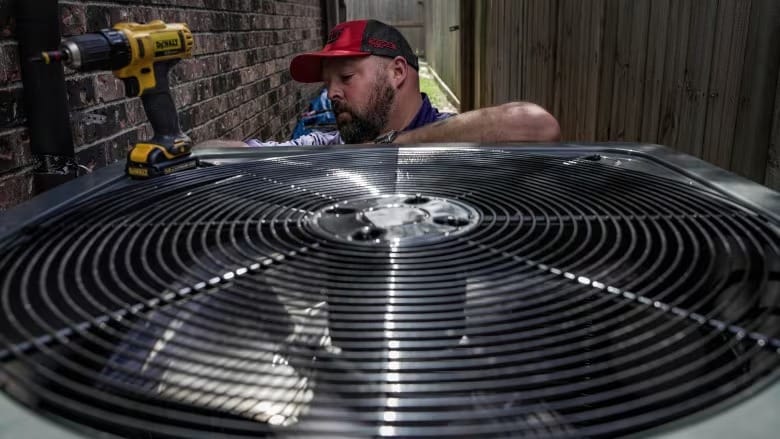As temperatures rise, so will the cost of an AC unit
A new refrigerant for AC units will make them less harmful to the environment, but more expensive

Star Vickery, who lives in Halifax, never used to need an air conditioning unit to stay cool. However, with summers getting hotter and her now working from home, it's become essential.
Cooling a home comes at a price. Vickery and her husband spent over $800 on the unit, not to mention the ongoing electricity costs.
"We can't live like this anymore. We need to have some comfort," Vickery shared with Cost of Living. "It's not an inconsequential expenditure. I mean, that's a lot of money."
That cost is set to increase. The price of air conditioning units is expected to rise due to regulatory changes aligned with the Montreal Protocol of 1987—an international treaty aimed at reducing harmful chemicals in the atmosphere, signed by Canada, the U.S., and the EU.
By 2025, air conditioning units will use a new type of refrigerant, R-454B, which emits fewer greenhouse gases than the current R-410A. However, this change will come with higher costs as manufacturers adjust, according to Jeff Johnson, who works at Arpi's Industries, an HVAC company in Calgary.
"Every manufacturer has to redevelop their whole product line and design new units with the new refrigerant," Johnson explained.
The Need for AC
Johnson stays busy during the summer months. According to 2023 data from Statistics Canada, about 64 percent of Canadians have air conditioning.
The way homes are built may also contribute to the growing need for air conditioning. Homes are designed to be energy efficient, retaining heat during winter, but this can make them uncomfortably warm in the summer.
Johnson estimates that new AC units will cost 10 to 20 percent more than current models, though exact figures are not yet available.
The current refrigerant, R-410A, is harmful to the environment, and it's impossible to completely prevent it from leaking into the atmosphere during installation, maintenance, or malfunction.
The International Energy Agency reports that there are about two billion AC units worldwide, a number that could nearly triple to over 5.5 billion by 2050. In 2022, air conditioning accounted for around seven percent of global electricity usage and three percent of carbon emissions, according to a report from Our World in Data.
"As you take off your gauges on the air conditioner, a little bit of refrigerant is always released—kind of like when you're at the gas station, and a little bit of fuel drips out when you remove the pump," Johnson said.
The new units will reduce these emissions. Warren Mabee, director of the Queen's Institute for Energy and Environmental Policy in Kingston, Ont., views this as positive for the environment.
"They are not as bad for the ozone layer and are less intense in terms of greenhouse gas emissions," Mabee said.
However, he warned that this won't be the last time consumers face higher costs due to climate-related policies.
"For everything from food to housing to clothing, you may not see it on the bill, but these costs are being factored in," Mabee said.
He pointed to food as an example: with supply-chain issues, some food items are harder to obtain, and trucking companies transporting them have to pay the carbon tax, a cost that often gets passed on to consumers.
Buy Now
Mabee stressed the importance of making environmentally friendly air conditioners accessible, as the need for them will only grow.
"There was the heat dome a few years ago that brought elevated temperatures for an extended period. We're reaching a point where everyone needs access to these air conditioners," Mabee said, referring to the extreme heat wave that hit Western Canada in 2021.
Vickery agrees. While her AC unit, nicknamed Big Bertha, was costly, she sees it as a necessity.
"Although it's a big expenditure, with global warming, we don't see things changing. So it's an investment, isn't it?" Vickery said.
"I don't like using an air conditioner. I don't like using the electricity. I don't think it's particularly good for the environment—me pumping hot air out of my apartment. But you have to live comfortably and be able to think."
In 2025, AC units with the old refrigerant can still be sold as long as stock lasts, up until 2026. Johnson advises those looking to avoid the price increase to purchase a new AC unit soon.
"And consider a heat pump, as well," he added.





